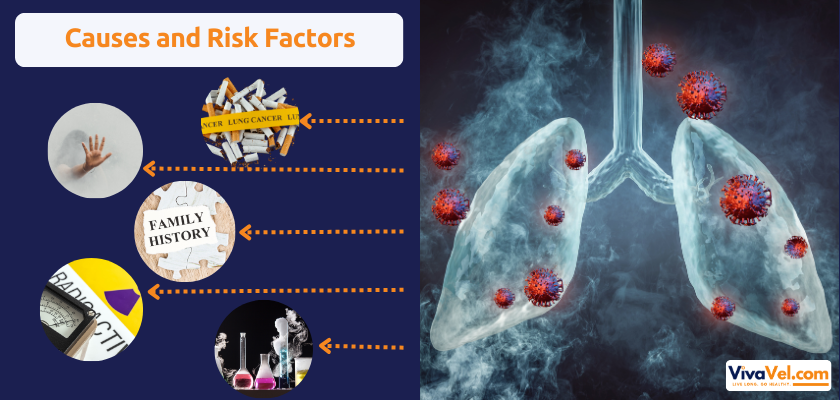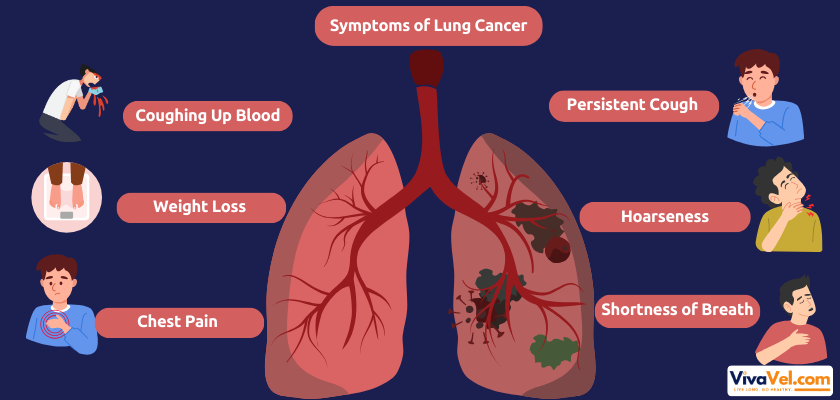
Home / Information / Blog / Blog Detail

Lung cancer is one of the most prevalent and serious forms of cancer globally. It occurs when abnormal cells in the lungs begin to grow uncontrollably, leading to the formation of tumors that disrupt normal lung function. Early detection is vital for improving survival rates; however, lung cancer is often diagnosed at later stages due to its subtle initial symptoms. This article will examine the causes, symptoms, risk factors, treatment options, and preventive strategies associated with lung cancer.
What is Lung Cancer?
Lung cancer is a disease that begins in the lungs when abnormal cells grow uncontrollably, forming tumors. If not treated early, it can spread (metastasize) to other parts of the body, making treatment more difficult. It is one of the leading causes of cancer-related deaths worldwide.
There are two main types of lung cancer:
1. Non-Small Cell Lung Cancer (NSCLC)
This is the most common type, accounting for about 85% of all lung cancer cases. It tends to grow and spread more slowly than small-cell lung cancer. NSCLC includes:
Adenocarcinoma – The most frequent type, often found in the outer parts of the lungs. It is more common in non-smokers and younger individuals.
Squamous Cell Carcinoma – Usually starts in the central part of the lungs, near the bronchial tubes. It is strongly linked to smoking.
Large Cell Carcinoma – A less common but fast-growing form that can appear anywhere in the lung.
2. Small Cell Lung Cancer (SCLC)
This is a more aggressive and rapidly spreading form of lung cancer, accounting for about 15% of cases. It is strongly associated with smoking and tends to spread to other organs quickly, making early detection crucial. SCLC grows much faster than NSCLC, which is why it is often diagnosed at an advanced stage.
Causes and Risk Factors:
The primary cause of lung cancer is smoking, responsible for nearly 85% of cases. Tobacco smoke contains thousands of harmful chemicals, many of which are carcinogenic. These substances damage lung tissues over time, leading to mutations that can result in the development of cancerous growth.
However, lung cancer is not exclusive to smokers. Non-smokers can also develop lung cancer due to several other risk factors, including:
Exposure to Secondhand Smoke – Inhaling smoke from cigarettes, cigars, or pipes used by others significantly increases lung cancer risk.
Air Pollution and Toxic Chemicals – Long-term exposure to pollutants such as asbestos, radon gas, arsenic, and diesel exhaust can contribute to the development of lung cancer.
Genetic Predisposition – A family history of lung cancer may increase susceptibility due to inherited genetic mutations.
Previous Radiation Therapy – Individuals who have undergone radiation therapy to the chest for other cancers may be at a higher risk of developing lung cancer later in life.

Symptoms of Lung Cancer:
Lung cancer symptoms can be subtle initially and are often mistaken for other respiratory conditions, such as bronchitis or pneumonia. By the time symptoms become noticeable, the cancer may have already progressed. Some common signs include:
Persistent Cough That Worsens Over Time – A chronic cough lasting more than eight weeks, especially if it produces mucus or phlegm with blood, should be evaluated.
Coughing Up Blood – Known as hemoptysis, this symptom can indicate lung damage or tumor growth affecting blood vessels.
Shortness of Breath and Wheezing – Tumors can obstruct airways, making it harder to breathe normally.
Chest Pain – Discomfort in the chest, back, or shoulders that worsens with deep breathing, coughing, or laughing.
Hoarseness – Changes in voice tone due to tumor pressure on the vocal cords.
Unexplained Weight Loss and Fatigue – Cancer cells consume energy, resulting in significant weight loss and persistent fatigue.

Diagnosis and Screening:
Early detection significantly improves treatment outcomes. Physicians use various methods to diagnose lung cancer, including:
Chest X-ray and CT Scans – These imaging techniques help identify abnormal lung growths at an early stage.
Biopsy – A tissue sample is collected through a needle, bronchoscopy, or surgical procedure to confirm the presence of cancer cells.
PET Scan and MRI – Advanced imaging techniques help determine whether the cancer has spread to other parts of the body.
Low-Dose CT Scans (LDCT) – Recommended for high-risk individuals (long-term smokers, those with a family history) to detect lung cancer before symptoms develop.
For high-risk individuals (long-term smokers and those with a family history), regular screening with low-dose CT scans is recommended.
Treatment Options
Lung cancer treatment depends on the type, stage, and overall health of the patient. The most common treatment approaches include:
Surgery – Removing part or all of the affected lung to eliminate cancerous tissue.
Radiation Therapy – High-energy rays target and destroy cancer cells, often used in conjunction with surgery or chemotherapy.
Chemotherapy – Drug treatments that circulate throughout the body to kill cancer cells or slow their growth.
Targeted Therapy – Medications designed to attack specific genetic mutations in cancer cells, leading to fewer side effects than chemotherapy.
Immunotherapy – Enhancing the body's immune system to recognize and fight cancer cells more effectively.
Palliative Care – Supportive treatment to alleviate symptoms and improve quality of life for patients with advanced lung cancer.
Prevention and Lifestyle Changes:
While lung cancer cannot always be prevented, adopting a healthy lifestyle can significantly reduce risk:
Quit Smoking and Avoid Secondhand Smoke – The single most effective way to prevent lung cancer is to stop smoking and minimize exposure to tobacco smoke.
Test Homes for Radon Exposure – Radon gas is a leading cause of lung cancer in non-smokers. Testing and mitigation efforts can help reduce exposure to the virus.
Reduce Exposure to Toxic Substances – Implement workplace safety measures to minimize prolonged exposure to carcinogens, such as asbestos, and industrial pollutants.
Maintain a Healthy Diet—A diet rich in fruits and vegetables provides antioxidants that help protect lung cells from damage.
Exercise Regularly – Physical activity strengthens lung function and overall health, thereby lowering the risk of cancer.
Routine Medical Checkups – Regular health screenings help detect potential issues early and increase the chances of survival.
Final Thoughts:
Lung cancer remains a significant health concern, but awareness and early detection can significantly improve outcomes. Understanding risk factors, recognizing symptoms, and undergoing regular screenings are key to early diagnosis and effective treatment.
If you or a loved one experiences persistent symptoms, such as a chronic cough, shortness of breath, or unexplained weight loss, consult a doctor immediately. Early detection increases the chances of successful treatment.
Help Spread Awareness!
Share this blog with your family and friends to learn about the prevention and early detection of kidney cancer.
With VivaVel, stay informed and stay healthy!


Cancer is one of the most daunting health challenges of our time. Still, advancements in medicine and technology are transforming how it is diagnosed and treated. Understanding cancer and its various types is crucial for health tourists seeking specialized care to make informed decisions about treatment destinations. This blog explores cancer, its different types, and why health tourism can benefit patients.
STEP 1
Let us know your details and preferences. We maintain absolute data confidentiality. All your health records are safe, and privacy is maintained.
STEP 2
A dedicated counsellor will help you with the Best Hospital & Doctors at the lowest possible Prices.
STEP 3
While you decide on the treatment plan, we assist you with priority appointments, Visa, Documentation, Hotel & other Logistics.
STEP 4
Our team assists you with all your local requirements like Hospitalization, Hotel Stay, Transportation, Food, Forex, Lab Tests, Medicines, etc.
STEP 5
We ensure a smooth discharge process. We also assist you in tallying your bills at the hospital, all necessary documentation, and your return trip.
Happy Patient from Bangladesh | Gastroenteritis Treatment in Columbia Asia Hospital, India

"VivaVel" has truly made a life-changing impact on our lives during a challenging time. My wife was diagnosed with Polycystic Ovarian Disease (PCOD), and despite consulting three different doctors in Bangladesh, we were unsatisfied and uncertain about the way forward. It was a confusing and challenging phase until a friend recommended VivaVel.
From the moment "I contacted them", VivaVel provided exceptional support and guidance. They arranged telemedicine consultations with two renowned international doctors, giving us the confidence to make an informed decision. After careful consideration, we selected one of the doctors for my wife's treatment.
VivaVel's assistance went above and beyond our expectations. They helped us with critical processes like obtaining a medical visa invitation letter, visa processing, and coordinating my wife's admission to "Artemis Hospital" in Delhi. They even suggested comfortable accommodations for me as a patient attendant.
What truly stood out was their unwavering support throughout our journey. The "VivaVel team" was always just a phone call away, offering guidance and reassurance during our stay in Delhi. Their professionalism and dedication to helping patients and their families are truly commendable.
I am incredibly grateful for the care and support from "VivaVel." They were a beacon of hope for us during this difficult time, and I sincerely hope they continue their outstanding service to help more needy patients.
Thank you, "VivaVel," for being there for us every step of the way!
Mr. Hoque, Dhaka, Bangladesh
Patient name: Shanta Islam, Dhaka, Bangladesh.

Note : VivaVel does not provide medical advice, diagnosis or treatment. The services and information offered on www.vivavel.com are intended solely for informational purposes and cannot replace the professional consultation or treatment by a physician. All Copyrights are reserved with VivaVel. VivaVel does not allow copying and cloning of its webpages and contents. VivaVel reserves the right to follow the legal procedures to protect its intellectual property.
Copyright © 2025 VivaVel.com . All Rights Reserve.





